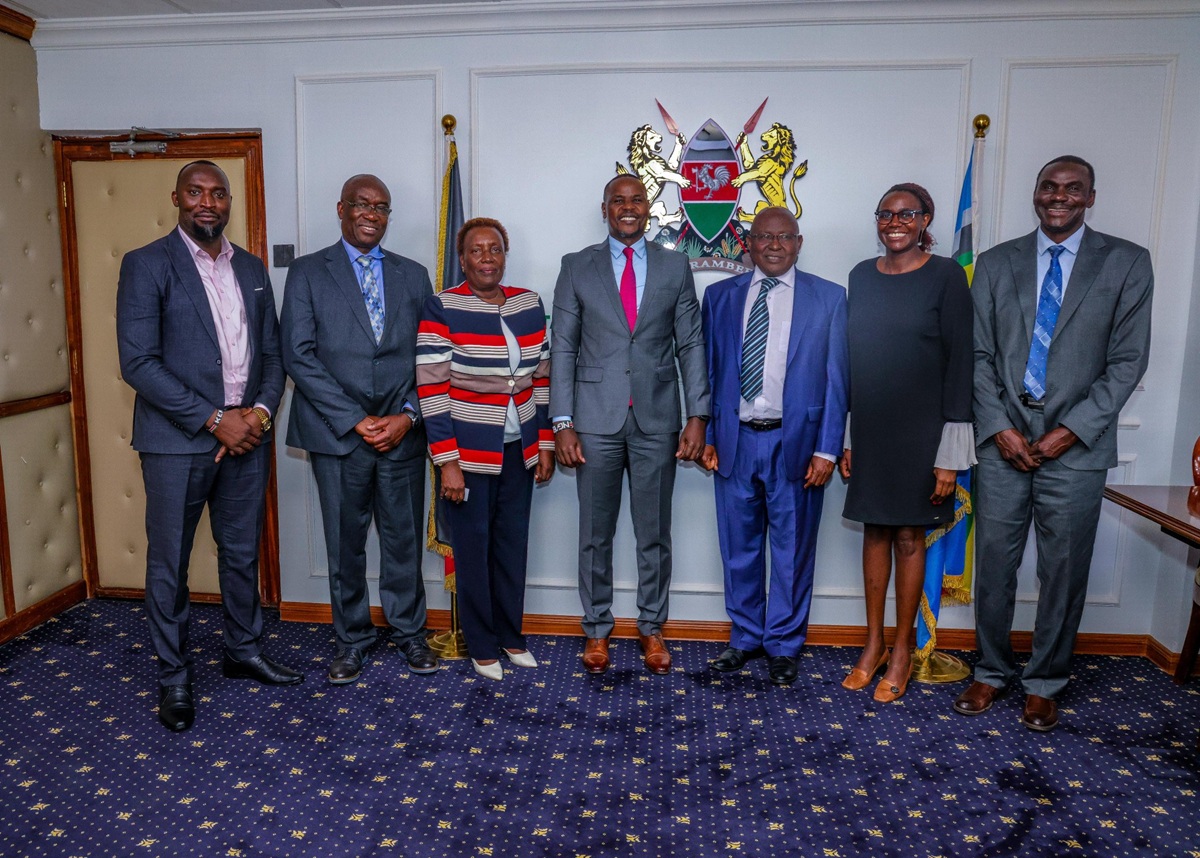By Kurian Musa
email: This email address is being protected from spambots. You need JavaScript enabled to view it.
Egerton University is stepping up its involvement in the ambitious Mau Forest Complex Integrated Conservation and Livelihood Improvement Programme (MFC-ICLIP), following high-level discussions with government.
Yesterday, Environment & Climate Change Principal Secretary Dr. Eng. Festus K. Ng’eno, who serves as Patron of MFC-ICLIP, met with a delegation from Egerton University led by Vice Chancellor Prof. Isaac Kibwage. The meeting explored collaboration aimed at safeguarding one of Kenya’s most vital ecosystems.
MFC-ICLIP is the Kenyan government’s 10-year programme designed to restore degraded landscapes, improve water catchment functionality, and promote sustainable livelihoods for communities dependent on the Mau ecosystem.
The effort is aligned with broader national goals including the Presidential “15 Billion Trees by 2032” campaign.
During the meeting, Egerton University expressed particular interest in several priority areas: rehabilitation of Kenyatta Dam, improving water quality management across roughly 260 water dams already mapped throughout the Mau landscape, strengthening the potato farming value chain, and expanding education and awareness efforts about conservation in communities close to natural resource bases.
“Egerton University is committed to applying its research and innovation capacity to support sustainable solutions for the Mau Forest Complex. Our work in areas such as water quality, agriculture, and education can directly complement government efforts,” said Prof. Kibwage. He was joined by Deputy Vice Chancellor Academic Research and Extension Prof Benard Aduda (Chair Egerton -Mau cross Country), Director Research Prof George Owuor and Director Marketing and Resource Mobilization Prof Nzula Kitaka.
According to Egerton’s past performance, these are more than promises. For example, the river Njoro rehabilitation project ; involving tree nursery work, community participation, riverbank stabilization and restoration of riparian land, has become a model.

Prof. Kibwage noted that the “restoration of River Njoro has shown us that community involvement and science-based interventions can reverse environmental degradation. We believe similar approaches can make a difference across the Mau ecosystem, including efforts to safeguard dams and rivers.”
Beyond the technical and ecological, the meeting also explored ways Egerton University could support community mobilisation and awareness creation through its student body.
A proposal was tabled for approximately 200 students to volunteer and assist in organising the upcoming MFC-ICLIP Marathon — a flagship event meant to raise awareness, mobilise resources, and bring communities together in support of Mau Forest restoration.
Dr. Eng. Festus Ng’eno welcomed Egerton University’s commitment, emphasising that higher learning institutions play a crucial role in sharpening scientific understanding, generating research-based solutions, and building capacity locally.
“MFC-ICLIP thrives on partnerships, and Egerton University brings both expertise and experience that will enrich the programme. Their role in research, community engagement, and innovation is critical for restoring the Mau Forest and improving the livelihoods of surrounding communities,” he said.
As part of scaling up the action, Dr. Ng’eno announced that Egerton University will host the first MFC-ICLIP Summit Conference early next year.
The summit is expected to bring together stakeholders from government, academia, development partners, and local communities, with the aim of coordinating efforts, sharing lessons, and aligning strategies for ecosystem restoration and sustainable development.
Egerton’s Track Record in Mau Ecosystem Conservation
Egerton University already has strong credentials in Mau ecosystem conservation. In recent years:
It has planted more than 200,000 tree seedlings in the Mau ecosystem, especially via its Shururu Forest rehabilitation and River Njoro restoration programmes.
Efforts to rehabilitate dumpsites near its campus and establish tree plantations and nurseries have helped not only improve local biodiversity but also raise awareness among communities and students about environmental stewardship. The university’s Faculty of Environment and Natural Resources Development (FERD) offers courses like Limnology and Wildlife Enterprise Management that equip students with technical skills to manage and protect ecosystems.
Egerton has partnered with NEMA to protect wetlands, including making land available for restoration, and advocating for protection of riparian zones and reduction of pollution and encroachment.
Outlook On New Partnership
The new partnership between Egerton University and MFC-ICLIP signals a scaling up efforts at a crucial time. With Kenya’s Mau Forest Complex under pressure from deforestation, unsustainable land use, climate change, and encroachments, integrating research, community engagement, dam and water management, and awareness is not only necessary but urgent.
If successfully implemented, the combined efforts could result in healthier catchments, restored ecosystems, improved water quality, more resilient agriculture (including potato value chains), and heightened environmental literacy in local communities.
As Prof. Kibwage said, the models already in place; such as Njoro River which provide a roadmap for what can be achieved where good science, community will, and institutional backing align.
The first MFC-ICLIP Summit, to be hosted by Egerton, will be watched closely. It may well set the tone for how Kenya addresses the twin crises of environmental degradation and climate vulnerability through partnerships that are both practical and rooted in local realities.
